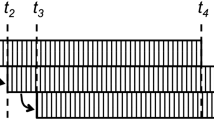Abstract
The arrival of large voluminous continuous queries sets for a given query leads an insignificant insights. The elimination of certain data tuples occurs in order to balance the system load. The streaming query removes the improper data tuples and uses proper data tuples in the form of defined tables or sets. However, major drawback occurs due to unbounded streaming and inadequate access to end data. Due to such constraints, many stream processing methods makes the processed data unavailable for any applications or to the related queries of neighborhood branches. This paper avoids such problems during the process of data tuples at the generation of queries. The study uses a streaming model that executes effective query plans in continuous data. The streaming model aims reduce the communication cost and improves the scalability of continuous aggregation queries. It sub-divides the client query and executes it over data aggregators within the incoherent limit. A weighted dominant query algorithm is formulated to provide the top dominant value in each sub-query clusters. This reduces the cost for computation in synthetic databases. The experimental results proved that the proposed model with weighted dominant query algorithm effectively improves scalability by reducing the computational cost.


Similar content being viewed by others
References
Lee, H.H., Yun, E.W., Lee, W.S.: Attribute-based evaluation of multiple continuous queries for filtering incoming tuples of a data stream. Inf. Sci. 178(11), 2416–2432 (2008)
Patroumpas, K., Sellis, T.: Maintaining consistent results of continuous queries under diverse window specifications. Inf. Syst. 36(1), 42–61 (2011)
Sagy, G., Sharfman, I., Keren, D., Schuster, A.: Top-k vectorial aggregation queries in a distributed environment. J. Parallel Distrib. Comput. 71(2), 302–315 (2011)
Lange, D., Naumann, F.: Cost-aware query planning for similarity search. Inf. Syst. 38(4), 455–469 (2013)
Jeon, J.H., Lee, K.Y., Kim, M.H.: Communication-efficient processing of multiple continuous aggregate queries. Inf. Sci. 284, 1–17 (2014)
Han, X., Li, J., Gao, H.: Efficiently processing (p, \(\varepsilon \))-approximate join aggregation on massive data. Inf. Sci. 278, 773–792 (2014)
Xu, J., Pottinger, R.: Integrating domain heterogeneous data sources using decomposition aggregation queries. Inf. Syst. 39, 80–107 (2014)
Bae, M., Kim, K., Kim, H.: Preserving privacy and efficiency in data communication and aggregation for AMI network. J. Netw. Comput. Appl. 59, 333–344 (2016)
Cui, G., Wang, X., Kwon, D.W.: A framework of boundary collision data aggregation into neighbourhoods. Accid. Anal. Prev. 83, 1–17 (2015)
Mousazadeh, M., Ladani, B.T.: Gossip-based data aggregation in hostile environments. Comput. Commun. 62, 1–12 (2015)
Nechifor, A., Albu, M., Hair, R., Terzija, V.: A flexible platform for synchronized measurements, data aggregation and information retrieval. Electr. Power Syst. Res. 120, 20–31 (2015)
Bustince, H., Beliakov, G., Dimuroa, G.P., Bedregal, B., Mesiare, R.: On the definition of penalty functions in data aggregation. Fuzzy Sets Syst. 323, 1–18 (2017)
Fernández-Duque, D.: Perfectly secure data aggregation via shifted projections. Inf. Sci. 354, 153–164 (2016)
Elkano, M., Sanz, J.A., Galar, M., Pȩkala, B., Bentkowska, U., Bustince, H.: Composition of interval-valued fuzzy relations using aggregation functions. Inf. Sci. 369, 690–703 (2016)
Garg, B., Garg, R.: Enhanced accuracy of fuzzy time series model using ordered weighted aggregation. Appl. Soft Comput. 48, 265–280 (2016)
Panah, A.S., van Schyndel, R., Sellis, T.: Towards an asynchronous aggregation-capable watermark for end-to-end protection of big data streams. Future Gener. Comput. Syst. 72, 288–304 (2017)
Mishra, V., Singh, V.: Generating optimal query plans for distributed query processing using teacher-learner based optimization. Proc. Comput. Sci. 54, 281–290 (2015)
Wu, D., Yang, B., Wang, R.: Scalable privacy-preserving big data aggregation mechanism. Digit. Commun. Netw. 2(3), 122–129 (2016)
Kao, C.: Efficiency decomposition and aggregation in network data envelopment analysis. Eur. J. Oper. Res. 255, 778–786 (2016)
Ma, A.Z., Fan, H.M., Zhang, E.Y.: Cruise homeport location selection evaluation based on grey-cloud clustering model. Curr. Issues Tour. 7, 1–27 (2017)
Wu, E., Li, B., Stathis, J.: June. Low-\(\kappa \) and High-\(\kappa \) breakdown statistics with variability: clustering model versus reconstruction methodology. In: 2015 IEEE 22nd International Symposium on the Physical and Failure Analysis of Integrated Circuits (IPFA), pp. 31–34. IEEE (2015)
Zhang, S., Wang, H., Huang, W.: Two-stage plant species recognition by local mean clustering and Weighted sparse representation classification. Clust. Comput. 20, 1517–1525 (2017)
Author information
Authors and Affiliations
Corresponding author
Rights and permissions
About this article
Cite this article
Madhankumar, M., Suresh Gnana Dhas, C. Improved continuous query plan with cluster weighted dominant querying in synthetic datasets. Cluster Comput 22 (Suppl 1), 1239–1246 (2019). https://doi.org/10.1007/s10586-017-1233-5
Received:
Revised:
Accepted:
Published:
Issue Date:
DOI: https://doi.org/10.1007/s10586-017-1233-5




